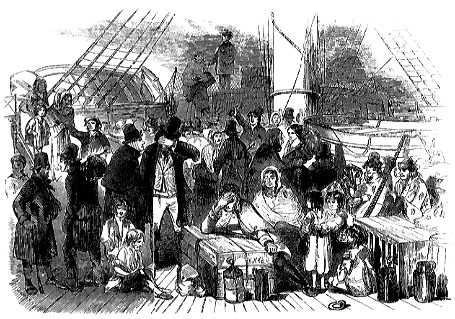|
Irish
emigration because of the Famine |
 |
For many people during the
famine there was a hard choice, death or emigration. Hundreds of
thousands of people fled from Ireland in order to survive. People
flocked into British ports such as Liverpool. Many arrived in Britain in
terrible condition; they carried diseases and needed immediate
attention. From Britain many emigrants decided to go to Canada and the
U.S. at a cost of £5. There was such a great queue for emigration to
America they began setting sail from Ireland to North America.
Conditions on emigration ships were terrible. People huddled together on
old, overcrowded and unsafe vessels. Food and sanitation were appalling
and disease, drunkenness and death were rampant. Some ships even sank on
the way. Because of this they became known as coffin ships. When the
emigrants arrived to Canada they had to go into quarantine on Grosse
Island, on the St Lawrence River near Quebec. |
A doctor wrote an account on the condition on the
passengers
On boarding the boat I found the passengers
in a most wretched state of filth and disease. No order or rules had been kept
or an attempt on cleanliness. Their excrement was thrown in to the ballast,
producing a stench, which made it difficult to stay below for any length of
time. I found 26 cases of fever, and received the names of 20 others, including
the captain, who died on the passage. The voyage had extended to 72 days. On the
landing the passengers at the sheds, I had to send 50 more to hospital and 6
have died since landing. The remainder, though weak, are healthy at present, and
have been made to clean themselves, their clothing and bedding, but most of them
are without a second change in clothing. The causes, which have produced disease
and death among these passengers, are:
1. Want of cleanliness.
2. Lack of food and water and that of unwholesome
quality.
3. Overcrowding.
These causes produce fever, and once disease sets
in, the stench of the sick, dying, and dead confined the hold (the captain was
kept 2 or 3 weeks on board after death), soon made the whole atmosphere unfit to
breathe. The captain, from all accounts was unfit to take care of a passenger
vessel. He was in ill health and a drunkard. The vessel did not provide the
passengers with any food: their own stock was soon eaten. The bunks were badly
put up, and came down on starboard side 2 or 3 days after leaving. The vessel
itself is the oldest in North England, (83 years old). The numbers of passengers
put on board exceeded by 60 or 70 the number allowed to the vessel."
